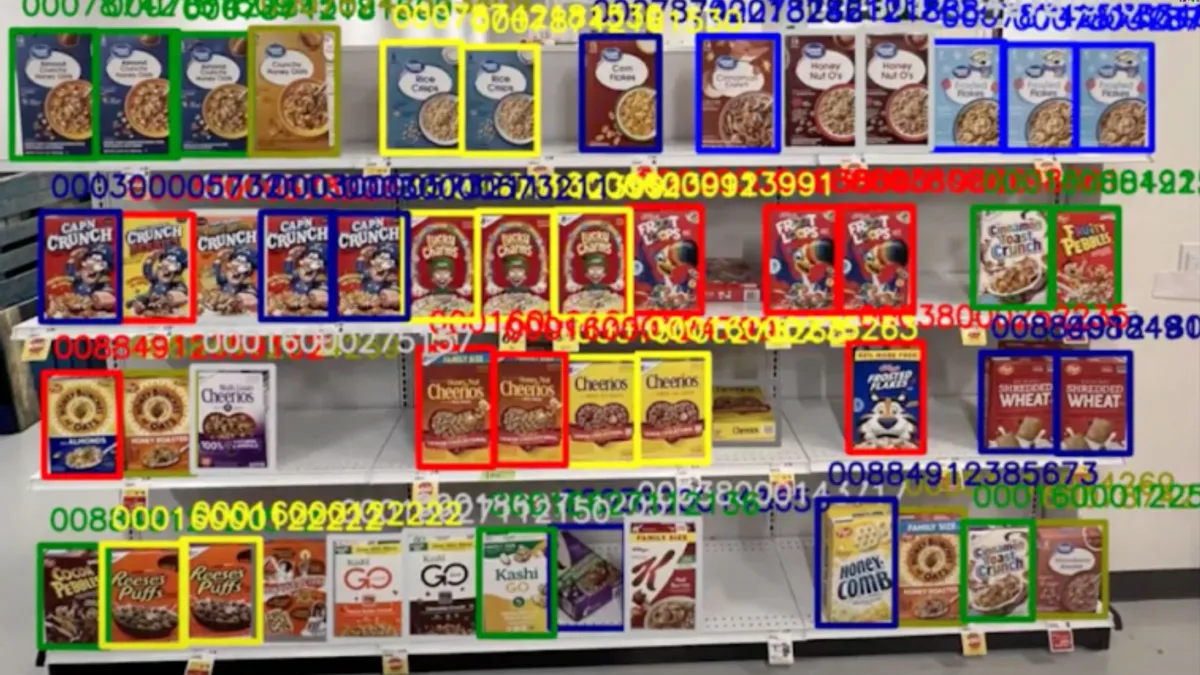Dive Brief:
- Google Cloud has designed artificial intelligence-driven technology that allows retailers to use imagery to automatically track items on store shelves, the internet giant announced last Friday.
- The system, which leverages a Google library with billions of data points to identify products in photos taken from multiple angles, is in preview now and is slated to be widely available “in the coming months,” according to the company.
- Google’s new offering augments other services it has developed to help retailers boost efficiency and digitize their stores.
Dive Insight:
Google said its shelf-checking tool is intended to let retailers automate the tedious task of monitoring products on their shelves without needing to spend time or money setting up an image-recognition system on their own.
The company showed off the technology this week during the National Retail Federation’s conference in New York, noting that it can alert retailers when products are out of stock and help ensure pricing accuracy. CPG suppliers, meanwhile, can use the system to ensure their goods are in the proper position in stores, Google said.
Google pointed to research from NielsenIQ showing that U.S. retailers lost $82 billion in CPG sales in 2021 because products were unavailable as a reason its technology would prove valuable.
The inventory-scanning system uses machine learning modules that can recognize products and tags to mine photos for details about items “of all types, at scale, based solely on the visual and text features of a product, and then translate that data into actionable insights,” according to the announcement.
Notably, Google said the image-processing tech it has come up with can handle photos taken from a variety of points of view — a capability that promises to give retailers added flexibility when using the system. The AI engine can work with images taken by cameras installed on the ceiling of a store or carried by robots that move up and down aisles. Stores can also feed photos taken by an employee using a mobile phone into the engine, according to the company.
Google announced the product-recognition technology alongside other additions to the range of AI-based services it offers to merchants. The improvements include a new personalized search capability for websites, a browse feature for digital storefronts and upgrades that allows websites to dynamically determine which products to recommend to shoppers.
The new technology puts Google in competition with companies that already supply retailers with automated imaging equipment to keep an eye on their shelves. Those companies include Simbe Robotics, which has inked deals to provide grocers including Hy-Vee, The Save Mart Companies and Schnuck Markets with mobile shelf-scanning robots.
In October, Sam’s Club completed a chainwide rollout of shelf-scanning technology from Brain Corp that is mounted on top of autonomous floor-scrubbing robots in the warehouse retailer’s locations.
Last week, Brain unveiled an inventory analysis tool for retailers developed in partnership with Google Cloud. Retailers will be able to use information from the system to increase revenue, improve margins and boost customer loyalty, Brain said in a press release.
In a reflection of the challenges tech companies can face as they look to convince retailers to use automation for inventory-related tasks, Walmart in late 2020 abandoned plans to use robots from Bossa Nova Robotics to keep track of items in its stores.
Catherine Douglas Moran contributed reporting to this story.

















